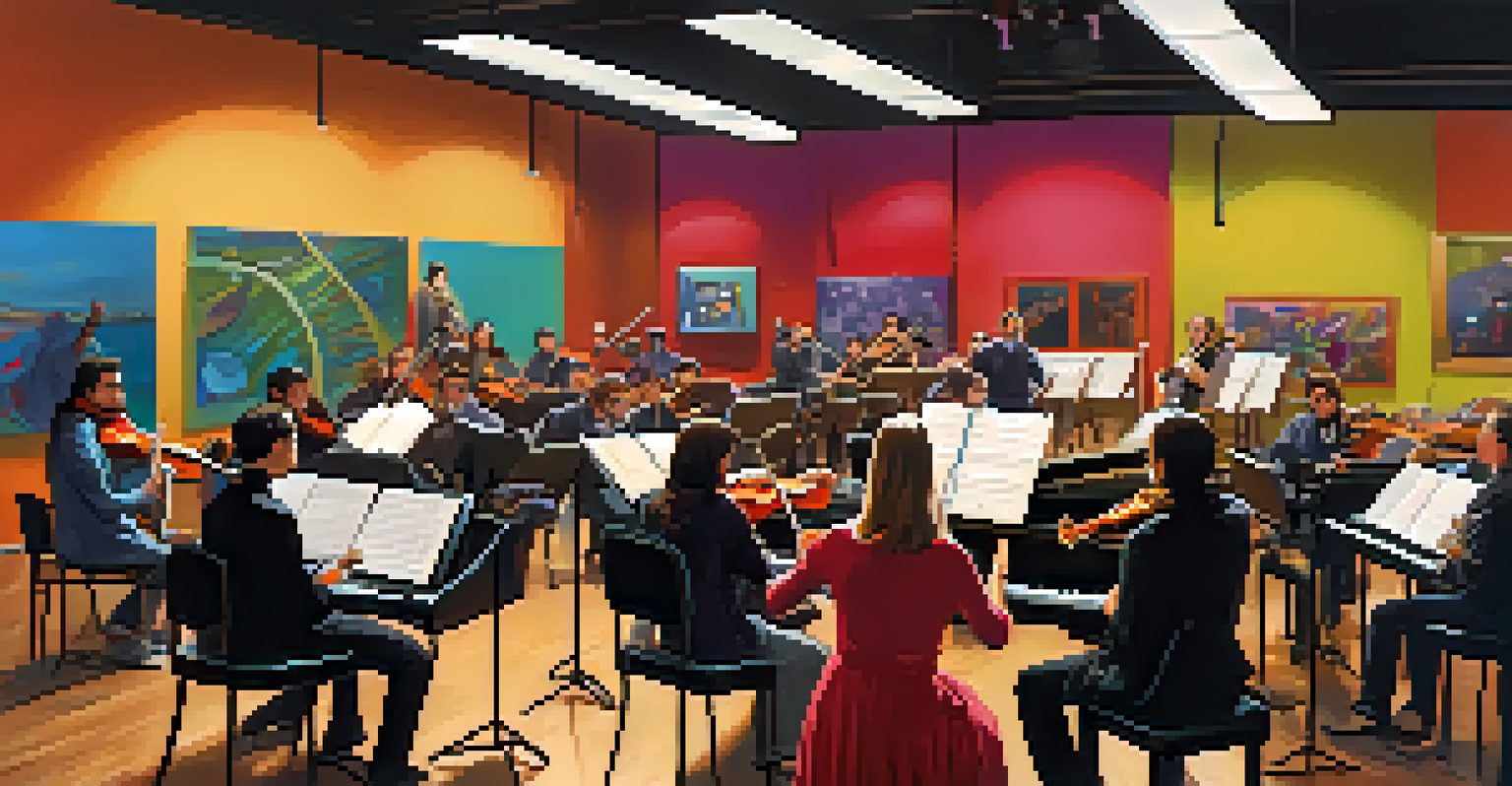The Power of Film Scores: Enhancing Emotion in Cinematic Storytelling

Understanding Film Scores and Their Role
Film scores are the musical compositions that accompany movies, playing a crucial role in shaping the audience's experience. They are more than just background music; they help to convey emotions, set the tone, and enhance the narrative. For instance, a suspenseful score can elevate tension in a thriller, while a gentle melody can evoke nostalgia in a romantic scene.
Music can change the world because it can change people.
The power of a film score lies in its ability to communicate feelings without words, allowing viewers to connect with characters on a deeper level. Think about iconic scores, like John Williams' music for 'Star Wars,' which instantly transports audiences into a galaxy far, far away. This connection between music and emotion is what makes film scores an essential part of cinematic storytelling.
In essence, film scores act as the heartbeat of a movie, guiding the audience through the highs and lows of the story. They can make us laugh, cry, or feel exhilarated, often enhancing scenes that might otherwise fall flat. Understanding their role is the first step in appreciating how they enrich our viewing experience.
The Emotional Power of Music in Film
Music has a profound effect on our emotions, and this is especially true in film. A well-composed score can evoke a range of feelings, from joy to sorrow, and everything in between. For example, the haunting notes of a piano can remind us of lost love, while an upbeat orchestral piece can make us feel triumphant and energized.

Directors and composers work hand in hand to ensure that the music aligns perfectly with the visual storytelling. Think about the stirring score of 'Titanic'—it captures the essence of the love story while immersing us in the tragedy. This synergy between visuals and music creates a more immersive experience that stays with us long after the credits roll.
Film Scores Enhance Emotional Impact
Film scores play a crucial role in shaping the audience's emotional experience by conveying feelings and enhancing narratives.
Ultimately, the emotional power of music in film is undeniable. It can heighten tension, create suspense, or bring resolution to a climactic moment. By tapping into our emotions, film scores make stories resonate on a level that visuals alone cannot achieve.
Iconic Film Scores That Changed Cinema
Some film scores have become legendary, forever altering the landscape of cinema. Composers like Ennio Morricone and Hans Zimmer have crafted unforgettable melodies that not only enhance their respective films but also become cultural touchstones. For instance, the 'Good, Bad and Ugly' score is instantly recognizable and evokes the essence of the Wild West.
The music is the soundtrack to our lives.
These iconic scores often transcend their films, becoming part of the larger musical canon. When you hear the opening notes of 'Jaws,' for example, you immediately feel a sense of fear and anticipation. Such scores have the unique ability to evoke specific emotions, making them memorable long after the film has ended.
In many cases, these scores also reflect the era in which they were created, influencing future composers and setting new standards. The impact of iconic film scores is not just about the music; it's about how they shape our understanding of storytelling in cinema.
The Science Behind Music and Emotion
The connection between music and emotion is backed by science, with studies showing that melodies can trigger emotional responses in the brain. This is why filmmakers carefully select scores that align with the mood of their scenes. A study published in 'Psychological Science' found that music can influence how we interpret film content, altering our perceptions of characters and situations.
For example, a minor key can evoke sadness or melancholy, while a major key might evoke happiness or triumph. This understanding of musical elements allows composers to craft scores that resonate with the audience's feelings, creating a more impactful viewing experience. The manipulation of tempo, harmony, and dynamics all plays a crucial role in how we respond to film music.
Iconic Scores Shape Cinema's Legacy
Legendary film scores have not only transformed individual movies but also influenced the broader landscape of cinematic storytelling.
By tapping into the science behind music and emotion, filmmakers can create a more compelling narrative. This scientific approach to film scoring ensures that the emotional intent of the story is delivered effectively, enhancing the audience's overall experience.
How Film Scores Shape Character Development
Film scores can significantly shape how we perceive and understand characters within a story. Composers often create specific themes for each character, allowing audiences to connect emotionally with them. For example, the recurring theme for a heroic character can evoke feelings of admiration and hope, while a villain's theme might instill fear or tension.
These musical motifs provide insight into a character's journey, often reflecting their internal struggles and transformations. In 'The Lion King,' Simba's theme evolves throughout the film, mirroring his growth from a young cub to a courageous leader. Through the use of music, filmmakers can enhance character arcs, making them more relatable and engaging.
In essence, a well-crafted score helps to humanize characters, allowing the audience to empathize with their experiences. This emotional connection is vital for storytelling, reinforcing the significance of music in character development.
Cultural Influences on Film Scoring
Film scores are often influenced by the cultural context in which a movie is made. Composers draw inspiration from various musical traditions, incorporating elements that resonate with the target audience. For instance, the score of 'Slumdog Millionaire' features a blend of Indian classical music and contemporary beats, reflecting the film's setting and themes.
This cultural infusion enriches the film's narrative, allowing viewers to experience the story through a unique auditory lens. By integrating local musical styles, filmmakers can create a more authentic connection with the audience, making the story more relatable and engaging.
Cultural Context Influences Scoring
Composers often integrate cultural elements into film scores, enriching narratives and creating deeper connections with audiences.
Moreover, cultural influences can also shape the emotional responses elicited by the score. The use of traditional instruments or styles can evoke specific feelings tied to cultural experiences, deepening the viewing experience and enhancing the overall impact of the film.
The Future of Film Scoring in Cinema
As technology continues to evolve, so does the art of film scoring. With advancements in digital music production and software, composers have more tools at their disposal to create innovative scores. This has led to a blending of traditional orchestral music with electronic elements, resulting in fresh and exciting soundscapes.
Moreover, the rise of streaming platforms has changed how scores are consumed, with audiences now able to listen to film music independently of the films themselves. This shift has given composers more freedom to experiment with their work, allowing them to reach a wider audience and explore new musical territories.

Looking ahead, the future of film scoring holds great potential for creativity and innovation. As filmmakers continue to push boundaries, we can expect to see even more dynamic and emotionally resonant scores that enhance the storytelling experience in cinema.